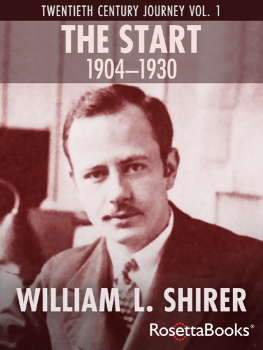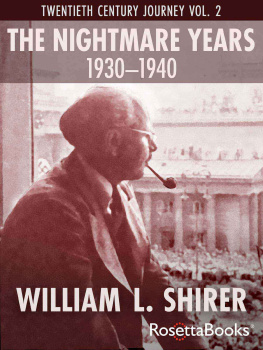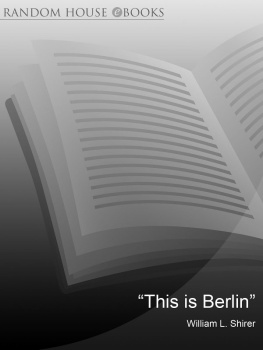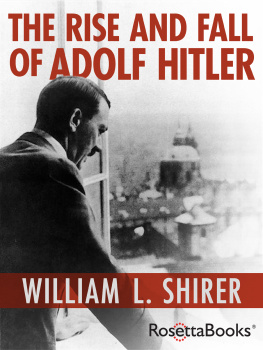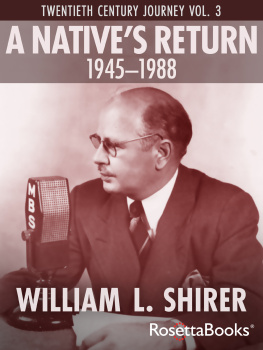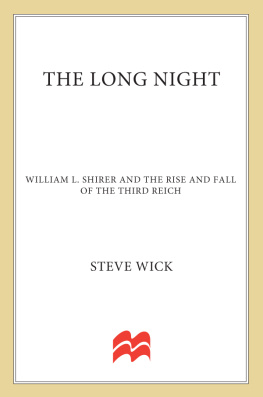The Start, 19041930
Twentieth Century Journey Vol. I
William L. Shirer
Copyright
The Start, 19041930
Copyright 1976, 2014 by William L. Shirer
Cover art, special contents, and Electronic Edition 2014 by RosettaBooks LLC
All rights reserved. No part of this book may be used or reproduced in any form or by any electronic or mechanical means, including information storage and retrieval systems, without permission in writing from the publisher, except by a reviewer who may quote brief passages in a review.
Cover jacket design by Alexia Garaventa
ISBN e-Pub edition: 9780795334214
There be many shapes of mystery;
And many things God brings to be,
Past hope or fear.
And the end man looketh for cometh not,
And a path is there where no man thought.
E URIPIDES
Thing of a day! Such is man; a shadow in a dream.
P INDAR
Quest-ce quun homme dans linfini?
P ASCAL
We are all born wholly uncivilized On a geological time scale we are still close to savagery.
J AMES H ARVEY R OBINSON
Every son of man travels an unbeaten patha road beset with dangers and temptations that no other wanderer met. His footsteps can be judged only in the full knowledge of the strength and light he had, the burden he carried, the obstacles he met and a thorough knowledge of every open and secret motive that impelled him.
C LARENCE D ARROW
What a wee little part of a persons life are his acts and his words! His real life is led in his head, and is known to none but himself.
M ARK T WAIN
Quel homme suis-je? En vrit je nen sais rien.
S TENDHAL
INTRODUCTION
The writing of memoirs, I find, is a strange and tricky business.
Can you tell the truth? Does memory, blurred and disjointed by the passage of time and fed by the imagination, lead you to recount more fiction than fact? William Allen White was afraid it did. This Autobiography, he warned in the preface to his memoirs, in spite of all the pains I have taken and the research I have put into it, is necessarily fiction. The reader, he said, should not confuse this story with reality. For God only knows the truth. White was merely trying, he concluded, to set down some facts which seem real and true to me.
That is all I have attempted to do in this memoir of a life and the times. I, too, have done years of research in a considerable pile of personal papers, though some were lost in the war and in travel, for a foreign correspondent led a nomadic life, living out of a suitcase. And I have been haunted and humbled by the warnings of poets, philosophers and memorialists whose abilities and attainments were far above mine. Montaigne thought man was simply incapable of attaining truth because he was the servant of customs, prejudices, self-interest and fanaticism The bane of man is the illusion that he has the certainty of his knowledge.
Isadora Duncan, who lived such a full and tragic life, used to talk to me about her memoirs while she was writing them in Paris. How can we write the truth about ourselves? she would ask. Do we even know it? Emily Dickinson thought that truth is so rare, its delightful to tell it. Delightful maybe, but difficult.
What is truth? To Santayana truth is a dream unless my dream is true. And Andr Malraux, in writing his memoirsor anti-memoirs, as he called themspeculated that the truth about a man is first of all what he hides, but he differentiated between what a man hides and what he ignores in himself. The two are not the same. Stendhal wrote one book after another about himself in an effort to understand who and what he was, but the search for the truth eluded him. What manner of man am I? he finally asked, and admitted: In truth, I havent the faintest idea.
There are other problems in writing memoirs. They have to do with the past and with time. The past is never dead, wrote Faulkner. Its not even past. You cannot ruminate about the past and write about it without transforming it. Immediately the imagination enters into play until it is impossible to separate memory from imagination. Or to sort out time. Einstein, for whom the conception of time was so important in his theory of relativity, and in mathematics and physics generally, thought it was impossible to sort it out. The separation between past, present and future, he said, has only the meaning of an illusion, albeit a tenacious one.
Rousseau, whose Confessions is probably the greatest and the most self-searing of all the autobiographies, thought first of writing simply a portrait of himself. He spent twelve years preparing to write it, assembling notes and mulling over notebooks, letters and other material. In the end he rejected the idea of doing a portrait, not only because he thought it would be static but because it would present a final judgment of himself made late in life. Time would play its tricks. Instead he decided to relate all that has happened to me, all that Ive done, all that Ive thought, all that Ive felt. I cannot be wrong about what Ive felt.
But he deceives himself. Like every other who writes of his life, he transforms it by the writing. That is why, wrote Marcel Raymond, the editor of the Pliade French edition of Confessions, the history of his soul, which he promised us, becomes, without his knowing it, the legend or the myth of his soul.
***
An observation or two about my own view of life, as a background to these memoirs:
Only rarely have I paused amid the trivia of living, which make up so much of our existence, and out of which come the setbacks, the triumphs, the sorrows and the rare moments of happiness, to consider how puny and unimportant we all are, how puny, in fact, is our planet. Even the solar system, of which the Earth is a negligible part, is but a dot in the infinite space of the universe. The limited space and time that we can comprehend are nothing in the incalculable extent and age of inorganic nature. Who can say, then, that the purpose of the universe, if it has a purpose, has been to create man? Who can even say that there are not billions of other planets on which there is some kind of human life, perhaps much further advanced than ours, or at least more sane, meaningful and peaceful?
Every persons life is of importance to himself, of course; it is the only one he has and knows. But in the universe of infinite space and time, it is insignificant. Quest-ce quun homme dans linfini? asked Pascal. Nothing. Perhaps Carl Becker, the historian, and one of the most civilized men I ever knew, grasped best our piddling place in the infinite.
Man [he wrote] is but a foundling in the cosmos, abandoned by the forces that created him. Unparented, unassisted and undirected by omniscient or benevolent authority, he must fend for himself, and with the aid of his own limited intelligence find his way about in an indifferent universe.
And in a rather savage world! The longer I lived and the more I observed, the clearer it became to me that man had progressed very little beyond his earlier savage state. After twenty million years or so of human life on this earth the lot of most men and women is, as Hobbes said, nasty, brutish and short. Civilization is a thin veneer. It is so easily and continually eroded or cracked, leaving human beings exposed for what they are: savages.
What good three thousand years of so-called civilization, of religion, philosophy and education, when right up to the 1970s, as this was being written, men go on torturing, killing and repressing their fellow-men? In fact, was there not a retrogression here? In my own brief time we vastly multiplied our capacity to kill and destroy. With the advent of the bomber and then the guided missile we not only slaughtered soldiers but also innocent women and children far behind the lines of battle.

